 Getty Images
Getty ImagesDick Cheney, who has died at the age of 84, had a glittering – if controversial – career in American public life.
He served as President Gerald Ford’s White House chief of staff in the 1970s, before spending a decade in the House of Representatives.
President George HW Bush made him defence secretary during the first Gulf War and the US invasion of Panama.
In 2001, Cheney became one of the most powerful vice-presidents in history.
He was a key architect of President George W Bush’s “War on Terror” after the 9/11 terrorist attacks, and an early advocate of the invasion of Iraq.
But, in his final years, he became a bitter critic of the Republican Party under the leadership of President Donald Trump.
“In our nation’s 248-year history, there has never been an individual who is a greater threat to our republic,” Cheney said of Trump.
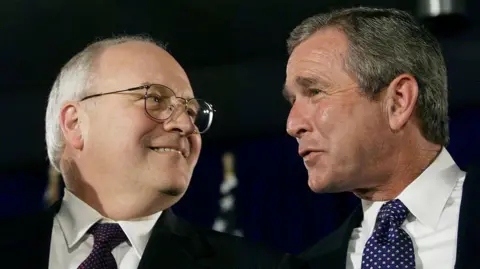 Getty Images
Getty ImagesRichard Bruce Cheney was born in Lincoln, Nebraska, on 30 January 1941.
His father worked for the US Department of Agriculture, while his mother had been a successful softball player in the 1930s.
When he was 13, his family moved to Casper, an oil town in Wyoming. In 1959, Cheney entered Yale on a scholarship, but failed to graduate.
He confessed that he fell in with “some kindred souls, young men like me who were not adjusting very well [to Yale] and shared my opinion that beer was one of the essentials of life.”
He went on to gain a Master’s degree in political science from the University of Wyoming but – like his future boss, George W Bush, he continued to party.
In his early 20s, Cheney was twice convicted of drink-driving. The incidents focused his mind on the future.
“I was headed down a bad road if I continued on that course,” he said.
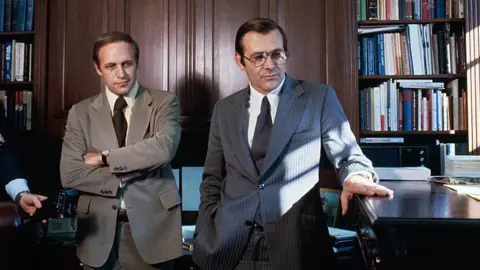 Getty Images
Getty ImagesIn 1959, when he became eligible to be drafted for military service, Cheney made the most of every legal avenue to avoid putting on a uniform.
He obtained a string of deferments, first so that he could finish his college course and then when his new wife, Lynne became pregnant.
“I don’t regret the decisions I made,” he said later. “I complied fully with all the requirements of the statutes, registered with the draft when I turned 18. Had I been drafted, I would have been happy to serve.”
Surprisingly this did not become a major campaign issue when he was running for the vice-presidency, even after Cheney questioned the ability of the Democratic presidential candidate, Senator John Kerry – himself a Vietnam veteran – to serve as commander in chief.
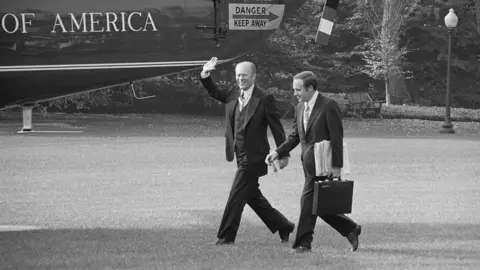 Getty Images
Getty ImagesDick Cheney’s first taste of Washington came in 1968 when he worked for William Steiger, a young republican representative from Wisconsin.
Legend has it that he caught the eye of Donald Rumsfeld, former defence secretary, then about to take over at the Office of Economic Opportunity (OEO) under President Richard Nixon.
Rumsfeld mentored Cheney, first in the OEO, and then in the Ford White House.
When Gerald Ford made Rumsfeld his defence secretary in 1975, Cheney found himself chief of staff at the White House. He was just 34 years old.
Eschewing the standard limousine for his battered VW Beetle, Dick Cheney proved a popular and approachable master of ceremonies.
“He made the system run,” said Brent Scowcroft, Ford’s national security adviser. “Everybody had access to the president, but it was smooth, orderly. He didn’t try to be a deputy president.”
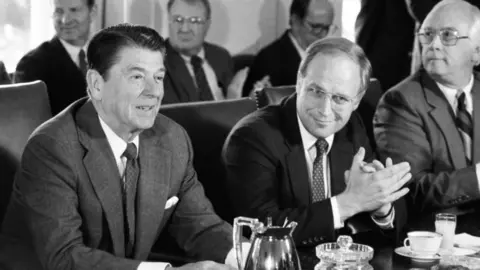 Getty Images
Getty ImagesWhen Ford lost the presidency in 1976, Cheney returned to Wyoming and stood for its House of Representatives seat.
But, weeks into the campaign and smoking three packets of cigarettes a day, he had the first of his many heart attacks.
While he was recuperating, Lynne continued to campaign on his behalf – and Cheney was returned with an impressive 59% of the vote.
During his decade in the House, he gained himself the reputation as a drier-than-dry conservative, enthusiastically supporting Ronald Reagan’s huge Cold War increases in defence spending.
More controversially, he opposed the release of Nelson Mandela from jail and was one of only 21 congressmen to vote against the prohibition of armour-piercing “cop killer” bullets.
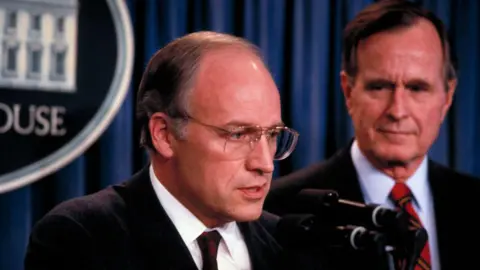 Getty Images
Getty ImagesEarly in 1989, he was given the chance of higher office when President George HW Bush’s nominee for defence secretary, Senator John Tower, was forced to withdraw amid allegations of heavy drinking and womanising.
Bush needed a congressman with a good reputation to take over at the Pentagon. He chose Dick Cheney and the Senate approved the choice without opposition.
Cheney’s years at defence were some of the most momentous since the end of World War Two. The Berlin Wall and the Soviet empire collapsed and the United States was left to rethink its whole doctrine.
Although hawkish by nature, he oversaw a huge post-Cold War reduction in the military budget – where the number of servicemen and women fell from 2.2 million to 1.8 million.
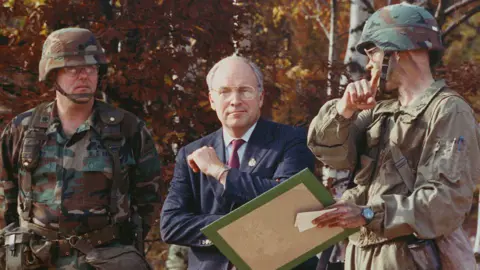 Getty Images
Getty ImagesMost of all, though, his time at the Pentagon will be remembered for the 1991 Gulf War with Iraq.
He took the lead in advocating military force against Saddam Hussein, whose troops had invaded Kuwait.
He persuaded Saudi Arabia’s King Fahd to allow the deployment of more than 400,000 United States troops on his territory in the lead-up to Operation Desert Storm.
Dick Cheney flew to Riyadh to plan the attack with his generals. After a five week air campaign, coalition forces began a ground war.
Within 100 hours, Iraq’s army had been routed.
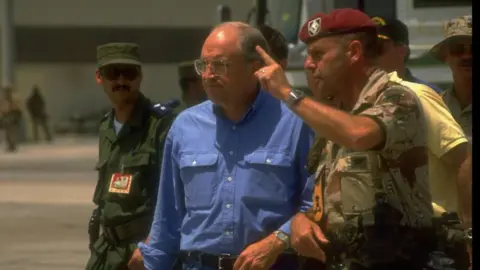 Getty Images
Getty ImagesGenerals Colin Powell and Norman Schwarzkopf received the ticker-tape parades. But Dick Cheney, as much as his soldiers, deserved credit for the success of Desert Storm.
Bill Clinton’s presidential election victory in 1992 saw Cheney leave Washington once again.
This time he became CEO of Halliburton, a huge multinational company that is a leading supplier of equipment to the oil industry. There he remained, until summoned back to public life by George W Bush.
Initially, he was asked to chair the search for someone to be vice-president. But, having reviewed his recommendations, the young presidential candidate asked Dick Cheney if he would join him on the ticket.
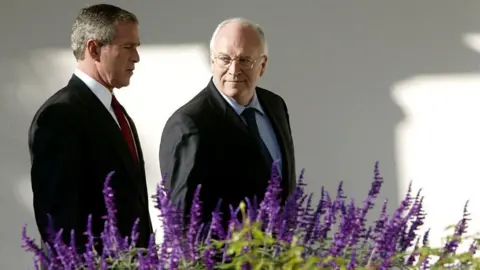 Getty Images
Getty ImagesAfter the attacks on 11 September 2001, Cheney was isolated from the president for a number of weeks – taken to an “undisclosed location” – in order to secure the succession if George W Bush was killed.
He was a leading advocate of US military action in both Afghanistan and Iraq. He insisted that Saddam Hussein was hiding weapons of mass destruction, and saw his defeat as the finishing of old business.
Cheney was a strong supporter of waterboarding captured terrorist suspects, declaring himself to be a “strong proponent of our enhanced interrogation techniques”.
But it was his close links to, and long experience in Congress which made him a new type of vice-president. Cheney kept offices in the Capitol building as well as near the commander-in-chief, so as to be at the heart of the legislative process.
He played an influential role in keeping Bush’s tax policies conservative, and rolling back environmental protections that were hampering American businesses.
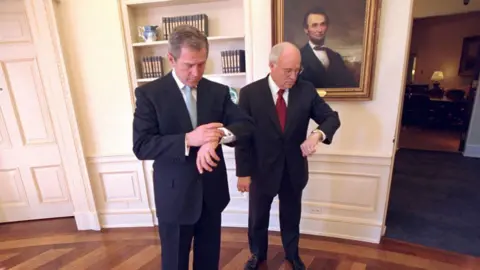 Getty Images
Getty ImagesCheney had the ear of the president at all times and was never slow in using his privileged access to by-pass other senior members of the administration.
He did so to some effect in 2001, when he persuaded Bush to sign an order stripping captured foreign terrorist suspects of their legal rights.
This was to the anger of the Secretary of State, Colin Powell who first heard about the decision when it was broadcast on the news channel, CNN.
In October 2002, and later in July 2007, while President Bush was undergoing medical procedures, Cheney became acting president for a few hours under the terms of the 25th Amendment.
But his inability to shepherd legislation through Congress brought accusations that Cheney was a liability.
And, even though George W Bush said that he would retain his running mate for 2004, there was pressure in Republican circles to dump him.
The president stood firm and Cheney played a central role in the decisive victory against John Kerry and his running mate John Edwards.
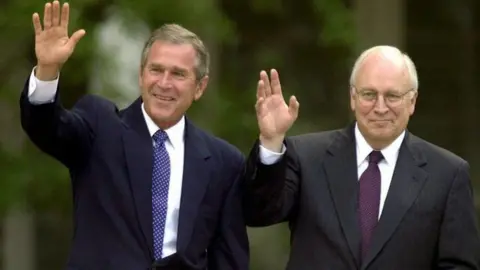 AP
APThere was one exception to his conservatism which emerged during the campaign.
He opposed a constitutional ban on gay marriage – supported by President Bush – because his daughter Mary was a lesbian.
Cheney announced that – although the final decision should be left to individual states – he was personally in favour of marriage equality. “Freedom means freedom for everyone,” he said.
His reputation became damaged when it emerged that Halliburton had won the contract to restore Iraq’s oil industry, and that he was to receive $500,000 in deferred compensation from the company.
More controversy was to follow. In 2005, his former chief of staff Lewis “Scooter” Libby was indicted on charges relating to the leaking of a CIA agent’s identity to the press.
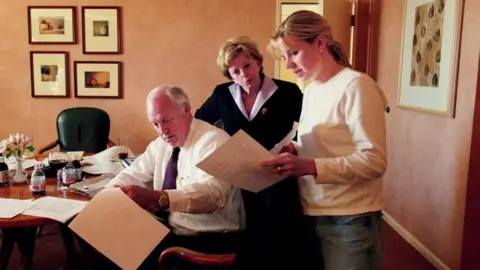 Getty Images
Getty ImagesAnd in 2006, after intense pressure from politicians and the media, Cheney was forced to take responsibility for accidentally shooting a hunting companion.
Harry Whittington, 78, was left with 30 pellets in his body, leading to a minor heart attack. Cheney later called the incident “one of the worst days of my life”.
The unfortunate episode became fodder for US late-night comedians and was seized upon by opponents as a damaging political metaphor – showing Cheney blasting away at the wrong target.
The vice-president also grew worried that terrorists might try and assassinate him, by sending an electronic signal to his pacemaker – having seen a fictional version of this plot on the TV series, Homeland.
“I was aware of the danger that existed,” he later wrote. “I knew from the experience we had and the necessity for adjusting my own device that it was an accurate portrayal of what was possible.”
The pacemaker was taken out and replaced with one that had no connection to wifi.
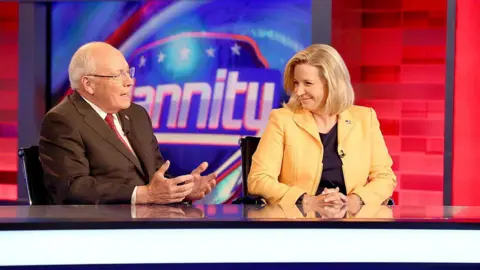 Getty Images
Getty ImagesAfter eight-years as vice-president, the man widely seen as the architect of President Bush’s “war on terror” left office in January 2009.
He became a critic of the Obama administration’s national security policies, opposing plans to close the US detention centre in Guantanamo Bay, Cuba.
He lashed out at his vice-presidential successor, Joe Biden, calling him “dead wrong” for saying another attack on the scale of 11 September 2001 was unlikely.
After a full heart transplant in 2012, he remained an active political figure. And, despite decades working for Republican presidents, he became a bitter opponent of President Donald Trump.
Having initially endorsed him in 2016, Cheney was appalled by allegations of Russian interference in the presidential election and Trump’s seemingly casual attitude towards Nato.
He supported his older daughter, Liz, as she became a leading Republican ‘never Trump’ in the House of Representatives – and condemned the refusal to accept the result of the 2020 election.
Dick Cheney later published a statement that he would vote for Kamala Harris in the 2024 presidential election.
It was an action that guaranteed that he will be remembered with mixed emotions on both sides of the political aisle.
For years, Cheney was a hero to the Republican right for his forthright manner and dry-as-dust ideological beliefs – and reviled by the left, who accused him of working for the interests of the oil industry.
But, he ended up supporting gay marriage and a Democratic presidential candidate – while his frequent attacks on Trump destroyed his relationship with his former party.

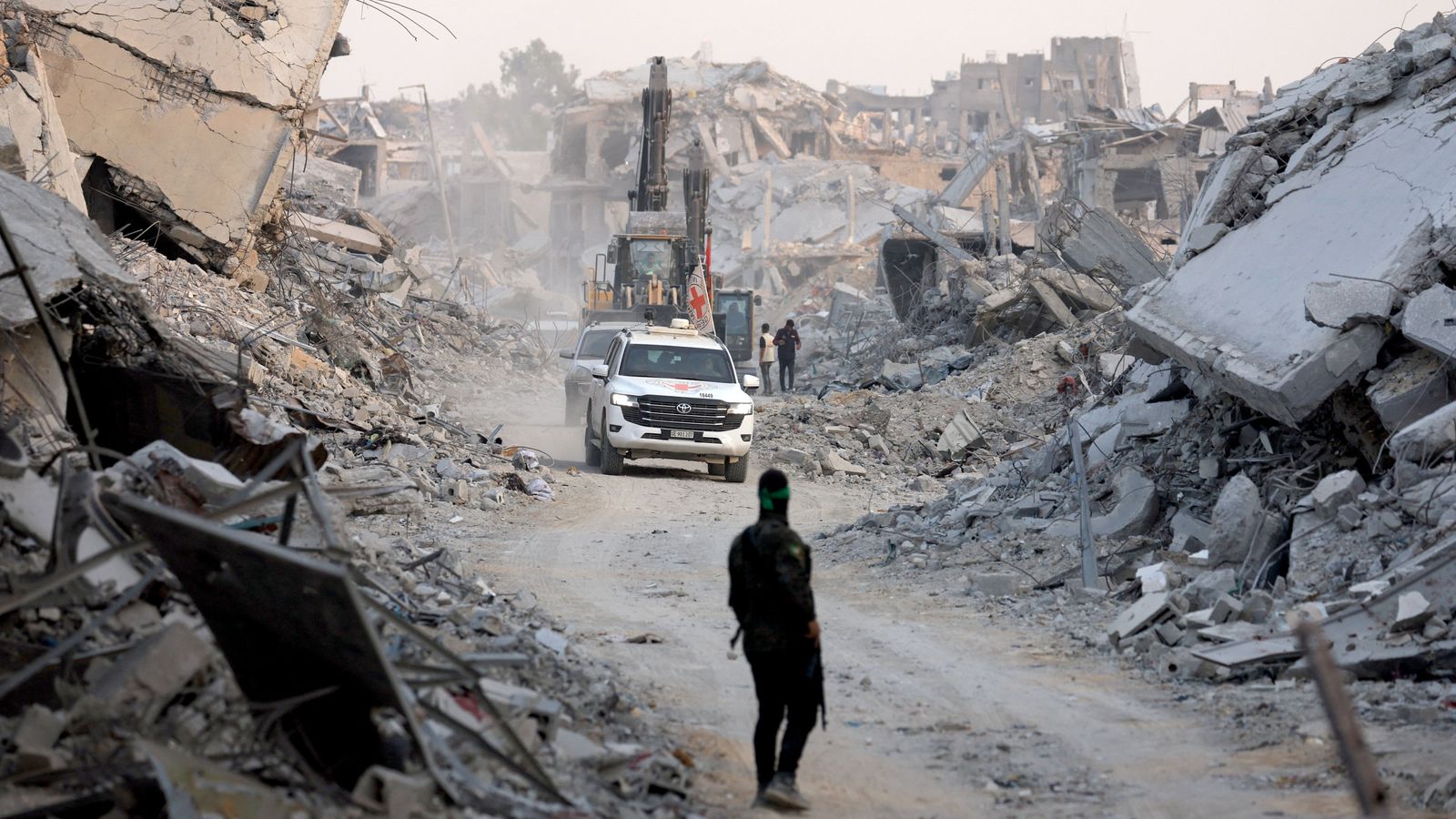
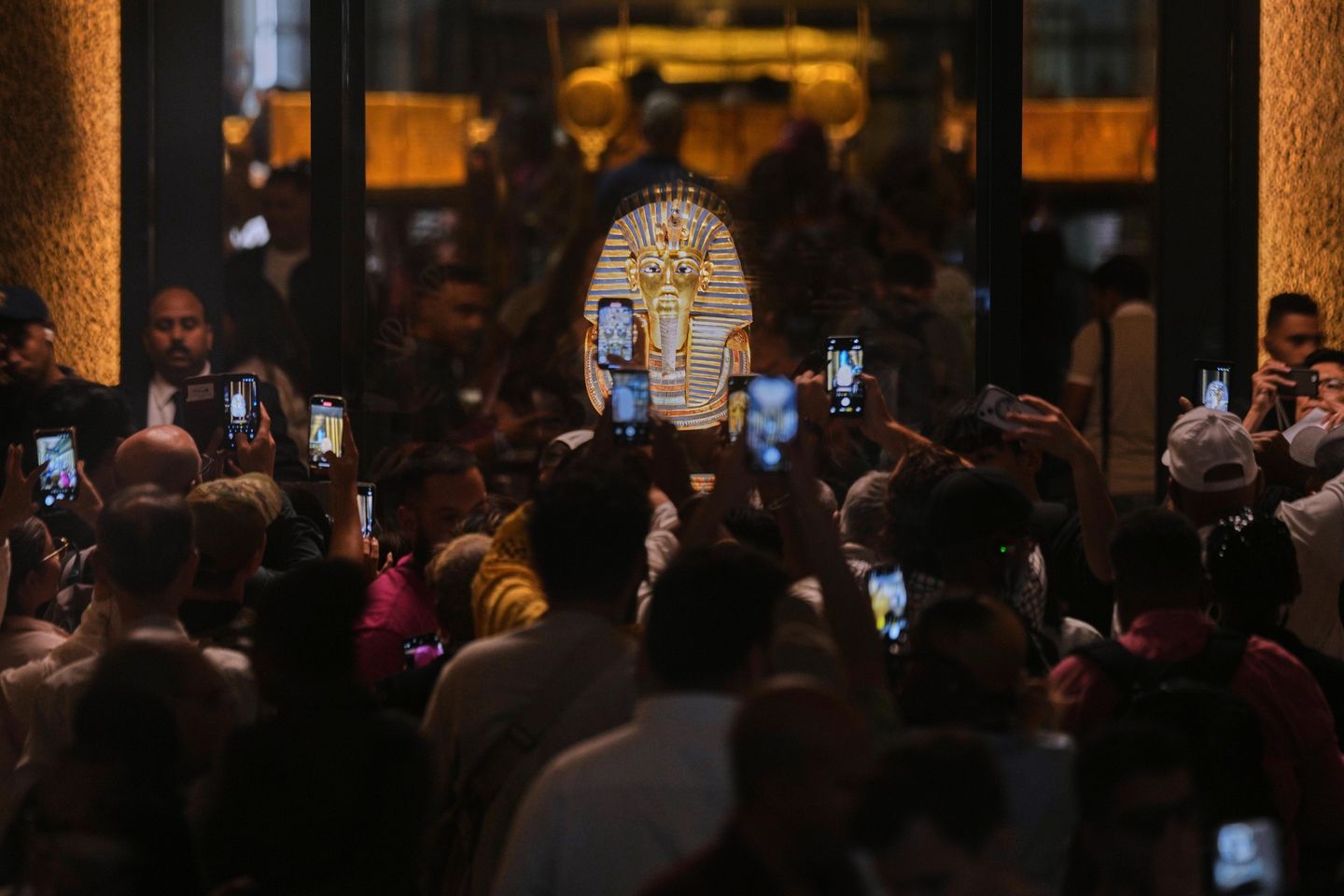
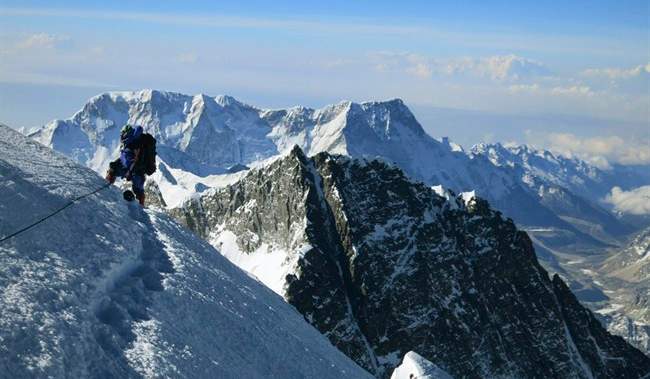
Leave a Comment